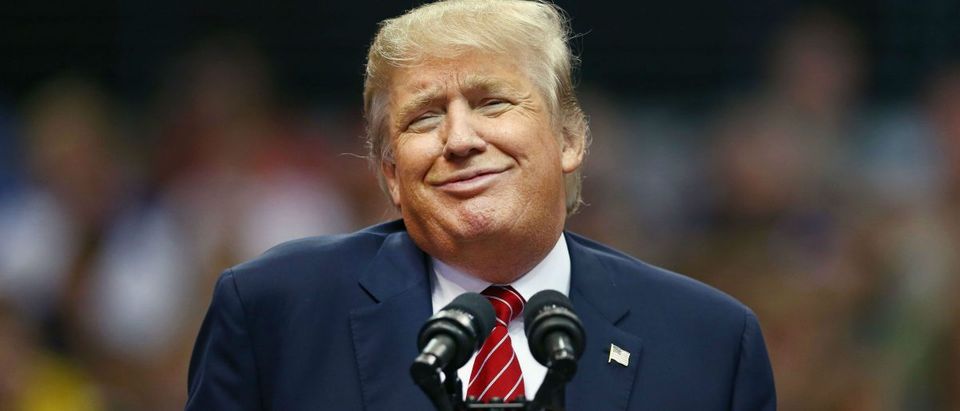When Rand Paul’s poll numbers nosedived early in the Republican primary, many GOP elites wiped the sweat off their brows.
There had been much speculation that the Kentucky senator’s candidacy could fundamentally change the Republican Party, especially by nudging it towards Paul’s less interventionist foreign policy. Now, they argued, the so-called “libertarian moment” was over. The rise of the Islamic State had made national security voters out of Republicans once again.
Not quite. The presumptive GOP nominee, Donald Trump, has called the Iraq war a “total disaster,” pledged bonhomie with Vladimir Putin, and literally wants to build a wall around part of the country. The misnamed “isolationism” that elites have long panicked about is back, and in force.
Meanwhile, a new survey from Pew, released last week, validates Trump’s approach. It finds that Americans are leery of overseas nation building and tired of being the world’s rapid-response team.
Fifty-seven percent of respondents told Pew the United States should focus on its own problems, while 37 percent say we should spend more time helping other countries. That means well over half of Americans reject the consensus among neoconservatives and liberal internationalists, which holds that President Obama has been detrimentally recalcitrant and the U.S. needs to shoulder a heftier burden in war zones like Syria.
Even more astonishing is the partisan breakdown. Sixty-two percent of Republicans told Pew that America should mind its own business, compared to 47 percent of Democrats. This is a total inversion of our political battle lines, which have long pitted hawkish Republicans against dovish Democrats. It’s a realignment, and it’s been personified in the presidential race, where Hillary Clinton is considered far more aggressive on foreign policy than Donald Trump.
It’s also filtered into the corridors of Washington’s foreign policy elites. Bret Stephens, a hawkish Republican scribe at the Wall Street Journal who embarks on a rampage every time someone has the temerity to suggest America shouldn’t intervene abroad, recently wrote a column calling Hillary Clinton “the conservative hope.” Add to his ranks former John McCain confidante and amanuensis Mark Salter, who declared, “I’m with her.” Neither directly referenced foreign policy, but it’s hard to imagine them bedfellowing up to Clinton were she a weak-on-defense liberal. Having migrated from the left to the right during the 1960s, many neoconservatives are now surveying their former territory with renewed interest, if only for the short term.
But hawks shouldn’t totally despair over the Pew survey. The results do show a 12 percent increase from 2013 in those who say we should spend more on defense, and a 24 percent increase among Republicans (although a solid majority still say we should either maintain current funding levels or cut them). Additionally, 55 percent want the United States to remain the world’s sole military superpower, while only 36 percent think another country should be allowed to pull even.
It seems slightly paradoxical: why furnish the most powerful military the world has ever known if you don’t think it should be extensively used? Similar results in the past have left writers scratching their heads, with one analyst concluding that the vox populi is “incoherent” on foreign policy. This is unfair. While the average American might not be aware of, say, the precinct breakdowns from the recent Iranian elections, he does have a very keen sense of broader trends, especially when he’s affected by them.
He looks back on the past 15 years and sees a lot of war, much of it done for humanitarian purposes, with few concrete results beyond excruciating occupation, trillions of dollars down the tube, and even more war. He opens the paper and reads about plans for more boots on the ground in Iraq, Syria, Libya, Yemen. Then he considers his hometown: the economy has recovered, but many of the recession’s symptoms still linger.
No wonder Pew records that 70 percent think the next president should focus primarily on domestic policy, while only 17 percent say foreign policy. Perhaps our John Q. prefers a new government jobs program, or a libertarian-flavored emphasis on free enterprise zones, or a more paleoconservative trade policy, but one approach he surely regards as inadequate is sending his sons to fight more wars while changing little to nothing at home. By all means, he says, destroy ISIS with the greatest military known to man, but stop chasing democratic mirages in the Middle East that hinder the greater mission.
What’s so incoherent about that?
With a more limited foreign policy back in style, all that’s left for interventionists to do is warn that Americans are “looking inwards” (as though that in itself is a bad thing). I won’t deny that the Pew survey reveals some troubling trends — especially in the direction of trade protectionism — but the desire to stop making the same mistakes on foreign policy isn’t one of them. In fact, it’s totally rational and predictable.
Matt Purple is a fellow at Defense Priorities and deputy editor of Rare Politics.


